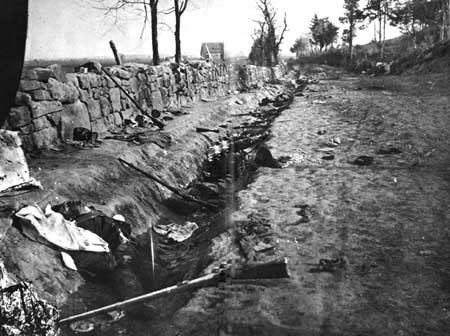|
FREDERICKSBURG and SPOTSYLVANIA COUNTY BATTLEFIELDS MEMORIAL National Military Park |
 |

On May 3, 1863, while attempting to
smash through Lee's rear and unite with Hooker's main force at
Chancellorsville, Sedgwick stormed the Confederate position on Marye's
Heights. This time Union infantry carried the stone wall and swept to
the top of the hill over the bodies of defenders such as these.
Sedgwick's action gained him little. The next day, still separated from
the main army, he had to beat off Confederate attacks from three sides
at Salem Church.
Courtesy of National Archives.
LEE MOVES NORTH
While Richmond rejoiced at the brilliant victory, the deep despair in Washington was summed up by Lincoln's anguished statement: "My God! What will the country say?"
The situation for the North was not as bad as it first seemed. In a sense, the Army of the Potomac had not been defeated, only its general. At no time during the battle had it been committed to action as an army. Over 40,000 troops had seen no action at all, despite Lincoln's admonition to Hooker to use all his men. The losses suffered in the campaign were soon made good by new recruits, and when Lincoln appointed George Meade to succeed Hooker, the Army of the Potomac was stronger than ever. Although few people realized it, while the North was losing battles it was at the same time inexorably winning the war by consistently whittling away at Southern resources.
And while Richmond celebrated, the truth was that the South had gained little if anything from the victory. To be sure, another "On-to-Richmond" drive had been stopped, but that was the extent of it. The loss of "Stonewall" Jackson was a serious blow to the Confederacy. Without him, the Army of Northern Virginia never again executed the bold and vigorous strategy that had characterized it. "I have lost my right arm," Lee declared sadly.
Nevertheless, the decision was made to attempt a second invasion of the North. The Confederate government believed that the victory at Chancellorsville had seriously affected Northern morale and hoped that an invasion now would put so much pressure on Lincoln that he would be forced to call a halt to the war. So Lee moved into Pennsylvania, only to be defeated by Meade at Gettysburg in July 1863. He then retreated back into Virginia and prepared to spend the winter in the Mine Run area behind the Rapidan.

|
|
Last Modified: Mon, Dec 2 2002 10:00:00 am PDT |


